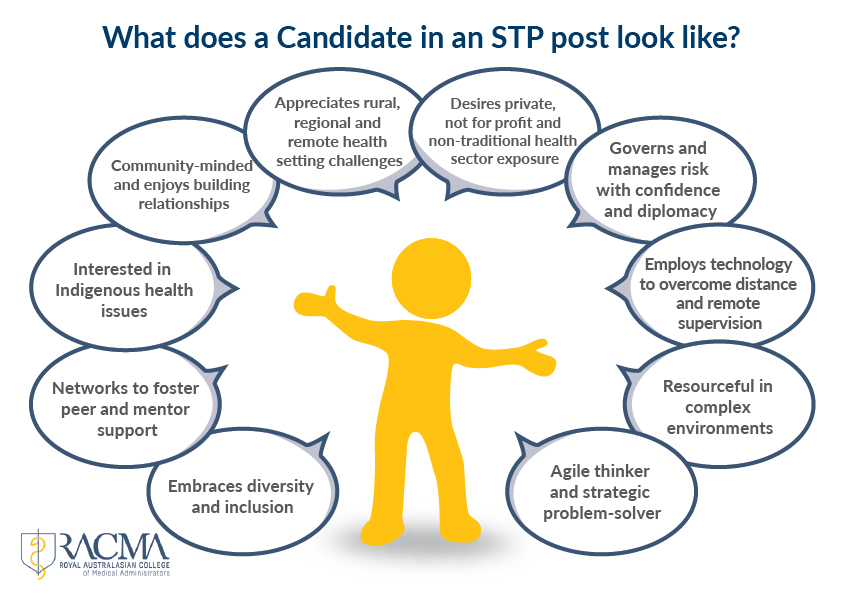

The role of the Supervisor of an STP or IRTP post
Supervisors play an essential role in the support and progress of Candidates in the Fellowship Training Program. The Supervisor is responsible for guiding the Candidate through their training, identifying any knowledge and training gaps and addressing these gaps. For STP funded or IRTP funded positions, there are additional requirements relating specifically to the funding provision. These activities are usually completed with the assistance of the nominated STP Liaison Officer.
If you have any questions about your role as a Supervisor please email accreditation@racma.edu.au or phone 03 9088 7962.
The role of the Liaison Officer of an STP or IRTP post
The STP Liaison Officer is the key contact for all matters relating to the STP or IRTP post and are nominated by the funded health setting. They work closely with the Primary Supervisor to ensure that contractual requirements are met, such as reporting and claims, invoicing, recruitment, and keeping RACMA informed of changes to the position or supervision arrangements.
Together with the STP Liaison Officer (nominated by the training organisation as the key contact for STP related matters), the Supervisor of the STP-funded Candidate also plays an important role in managing the STP position and contractual responsibilities. In some cases, the nominated STP Liaison Officer may also be the Supervisor.
Contractual obligations
RACMA administers STP funding by entering into a Secondary Funding Agreement (SFA) with training organisations for the current STP funding period. The SFA outlines all contractual obligations of RACMA and the funded training organisation. The SFA must be read and understood by the key staff of the organisation involved in managing the STP post.
The SFA includes:
- information about the training position (also referred to as the STP Post)
- information about the training locations the trainee will rotate to while in this STP funded position (rotational facilities)
- reporting requirements and obligations
- a schedule of payments and reporting dates
- the STP reference number for each position funded under the Agreement.
The funding cycle depends on the length of the current Agreement between RACMA and the Department of Health. When RACMA’s funding with the Department is extended, new SFAs or extensions (Deeds of Variation) are issued as required.
Reporting obligations
The Supervisor of the STP or IRTP funded position is expected to:
- Submit timely and accurate reporting for each six-month rotation in accordance with the SFA.
- Immediately notify RACMA of any vacancies or changes to the trainee’s rotations and supervision arrangements.
- Immediately report any intended changes to the trainee’s FTE spent in a metro/rural location, or a public/private setting, as this may affect the funding payments.
- Ensure that STP funding is expended as per the requirements of the Secondary Funding Agreement and the Department of Health, in line with the STP Operational Framework.
- Retain all relevant evidence of claims and expenditure for audit purposes.
- Ensure all communications sent by RACMA are noted and communicated to other key staff in the organisation, including Finance/Accounts staff.
- Notify RACMA when there is a change of Liaison Officer due to extended leave or staff change.
Report submissions
- Progress Reports and Claim Forms (based on templates provided) are emailed to STP Liaison Officers approximately 1 month before they are due to be submitted to RACMA.
- The Liaison Officer must complete the STP Progress Reports and Claim Forms, then email them to stp@racma.edu.au by the due date. In some instances, the Candidate occupying the STP-funded position may be involved in the completion of this Report.
Reporting Term Reporting Period Due Date
Term 1 1 February to 31 July 7 August
Term 2 1 August to 31 January 7 February
Funding calculation
Calculations of STP payments are based on information contained in the Progress Reports and Claim Forms. Payments may be affected by:
- changes to the FTE of the trainee during the reporting period (pro-rata adjustment is made)
- changes to the rotational arrangements of the trainee where they spend time in locations outside rural or private settings (i.e. public metropolitan settings)
- the extent to which RSL or PICS funding has been used during the reporting period.
Payments and invoicing
-
- Payments to STP funded settings are made in arrears, after Progress Reports and Claim Forms submitted for the current reporting period are verified and an invoice is requested. STP funds will be paid to the health setting within 30 days of receipt of a correct tax invoice.
Difference between rural STP and IRTP funded posts
IRTP posts are designed to enable a Candidate to complete most of their Fellowship training in rural areas with limited metropolitan exposure.
Rural STP posts and IRTP posts are funded in a similar way. Both receive salary support and Rural Support Loading (RSL). IRTP posts also receive funding to support the Supervisor of the role.
Candidates occupying IRTP positions are expected to spend a minimum of 66% of their RACMA training time in a rural (MM 2-7) location and show a genuine commitment to rural training. The STP Supervisor/Liaison Officer must ensure that candidates occupying an IRTP-funded position are made aware of this requirement during the recruitment process, and that their training pathway is planned to accommodate this.
Vacancies and recruitment
RACMA is required to ensure that STP funded posts are filled with minimum vacancy rates. For this reason, health settings are asked to:
- identify and report unfilled positions to RACMA immediately.
- Seek approval from RACMA should there be any changes to the nature of the funded position (e.g. registrar to substantive post).
- If an STP-funded post becomes vacant, the health setting will be given a reasonable amount of time to recruit. If recruitment attempts are unsuccessful, RACMA may offer funding to a health setting on RACMA’s Reserve List.RACMA offers free promotion of vacant STP-funded positions via advertising on the RACMA website, and broadcast email to RACMA members/subscribers.
- for website advertising, use the Medical Administration Registrar Booking Form (for all positions including substantive positions)
- for email promotion, email your request to stp@racma.edu.au
SIMG trainees
Specialist International Medical Graduate (SIMG) trainees may only occupy STP-funded settings if they are genuinely moving to Australia and intend to apply for permanent residency. The Supervisor or STP Liaison Officer should consult RACMA before appointing an SIMG to an STP-funded position.
PICS Allowance – for private STP posts only
The aim of the PICS (Private Infrastructure and Clinical Supervision) Allowance is to support the delivery of STP in private sector settings, and ensure that health settings provide appropriate supervision of their STP Candidates in accordance with the accreditation standards set by RACMA. PICS can be used to support eligible clinical supervision or infrastructure expenses in the private setting.
The Supervisor’s administrative role requires an understanding of complex systems that are constantly in transition. As the medical system and training requirements change, there may be additional administrative burdens placed on the clinical supervisor.
PICS is managed in accordance with the Department of Health’s PICS Guidelines. Private STP settings may claim PICS funding for eligible expenses of up to $30,000 (GST exclusive) per 1 FTE, per annum. PICS is linked to the specific training position and is not paid directly to Candidates or Supervisors.
Eligible clinical supervision expenses include:
- Administrative support
- Educational support (supervision time)
- Networked supervision support
- Supervisor development and training
- training room outfitting, including purchasing specific training equipment such as microscopes for trainees and training simulation equipment
- expenditure for initial training post setup, including any costs associated with recruitment and retention
- minor renovation of existing facilities to make space within the training setting suitable for use in registrar training
- videoconferencing facilities
- investments in on-line educational training software and relevant online journal access
- overhead infrastructure in general i.e. office asset equipment purchases that will be used by Candidates and their Supervisors (i.e. computers; phones; desks; IT equipment and associated facilities).
Eligible infrastructure expenses include:
IRTP Supervision Support Allowance – for IRTP posts only
The aim of the IRTP Supervision Support Allowance is to support the delivery of IRTP in rural settings, and ensure that health settings provide appropriate supervision of their IRTP Candidates in accordance with the accreditation standards set by RACMA.
The Supervisor’s administrative role requires an understanding of complex systems that are constantly in transition. As the medical system and training requirements change, there may be additional administrative burdens placed on the clinical supervisor.
The Allowance is managed in accordance with RACMA’s IRTP Supervision Support Guidelines. IRTP settings may claim support for eligible expenses of up to $25,000 (GST exclusive) per 1 FTE, per annum. This Allowance is linked to the specific IRTP training position and is not directly paid to the Supervisor.
Eligible clinical supervision expenses include:
- Administrative support
- Educational support (supervision time)
- Networked supervision support
- Supervisor development and training
Rural Support Loading (RSL) – for Rural STP and IRTP posts only
In recognition of the additional costs associated with training in regional, rural and remote locations, Rural Support Loading (RSL) is intended to incentivise STP trainees to undertake training in regional, rural and remote locations. It aims to reduce some of the barriers for both the trainee and/or health setting hosting the trainee.
“Rural” is defined as being located in a Modified Monash Model (MM) 2-7 area. To check if your health setting is within the MM 2-7 area, visit the DoctorConnect website.
RSL payments are managed in accordance with the Department of Health’s RSL Guidelines. Rural STP health settings may claim RSL for eligible expenses of up to $25,000 (GST exclusive) per 1 x FTE per annum, while IRTP health settings may claim up to $20,000 (GST exclusive) per 1 x FTE per annum. RSL is linked to the specific training position and is not paid directly to Candidates.
Supervisors of STP rural or IRTP posts must ensure that Candidates can utilise the RSL allowance to its fullest extent for eligible items within the Guidelines.




